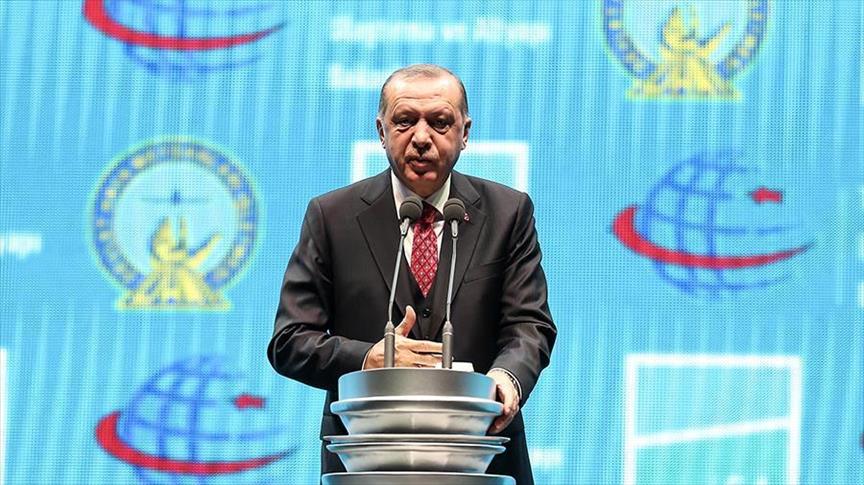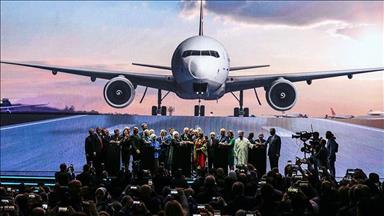
By Muhammed Ali Gurtas and Tuba Sahin
ANKARA
Istanbul Airport, the “world's new hub,” officially opened by Turkish President Recep Tayyip Erdogan on Monday, the 95th anniversary of the founding of the Turkish Republic.
Speaking at the massive new airport’s inauguration ceremony, President Erdogan said it would be a model to the world in terms of its architecture, construction, operation, and financing.
The ceremony was attended by a host of world leaders, including the presidents of Albania, Kyrgyzstan, Kosovo, the Turkish Republic of Northern Cyprus, Macedonia, Moldova, Pakistan, Serbia, and Sudan, plus the chairman of Bosnia and Herzegovina's Council of Ministers, Azerbaijan's parliament speaker, Bulgaria's prime minister, and ministers and high-level officials from various other countries.
Pointing to the new airport's name, Erdogan said Istanbul is Turkey's largest city by population and also its most valuable brand name.
"We see Istanbul Airport as an investment not only in our country but also in our region and the world," said Erdogan.
Erdogan said once all its stages are completed, Istanbul Airport will serve 150 million passengers annually.
"If needed, the annual capacity can be raised to 200 million," he added.
With Monday's opening of the first phase, a total of 90 million passengers can use the airport on a yearly basis.
Erdogan noted that the airport will continue to grow over the next decade, until all phases are completed by 2028.
"Generating its own energy, the environmentally- and handicapped-friendly airport will create 120,000 jobs."
Turkish airports nationwide welcomed nearly 164 million people between this January and September, with over 31 percent of air passengers using Istanbul Ataturk Airport, up to now Turkey’s busiest airport.
$11.6B total investment
After the country’s national flag carrier, Turkish Airlines, shifts to the new airport -- Istanbul Airport -- by year's-end, Ataturk Airport will transition to other uses, such as training activities, aviation fairs, and civil use.
"Ataturk Airport will maintain its status as an airport but it will be closed to commercial flights," Erdogan said.
The new airport represents a €10.3 billion ($11.6 billion) investment in all its phases, said Erdogan, adding that it will provide nearly €22.2 billion ($25.3 billion) in revenue to the government.
The €6 billion ($7.2 billion) first stage, which was built in nearly three years through a public-private partnership model, is one of a series of mega-projects planned for Turkey’s 2023 centennial.
Stressing the importance of domestic finance, Erdogan said: "Some €4.5 billion of the first phase was financed by three state-run lenders [Halkbank, Ziraat Bankasi, and Vakifbank], plus private lenders."
"There is no Treasury guarantee or similar commitment in the financing of Istanbul Airport," Erdogan said.
"Spread over an area of nearly 76.5 million square meters, the airport is really a giant work, with six separate runways, parallel taxi ways, nearly 2 million square meters of indoor area, a rail system between terminals, cargo and general terminals, outdoor and indoor parking areas, leisure centers, and so on," he said.
On Monday, two runways -- stretching 3,750 and 4,100 meters long -- went into service as a part of the first phase, including three separate airstrips.
At full capacity -- with the completion of all four phases with six runways -- Istanbul Airport is set to become a global aviation hub by hosting more than 100 airlines and flights to over 300 destinations around the world.
Erdogan said the new airport will put Turkey on track to become the most important transit center between north, south, east and west by connecting 60 countries with economies totaling $20 trillion.
"Thanks to the new airport, Turkey will improve its key role in the integration of global economies," he said.
"With Istanbul Airport in service, European airspace will need to be restructured," he said. "Since Istanbul will be the most important transfer point, the routes of intercontinental flights will also change considerably."



